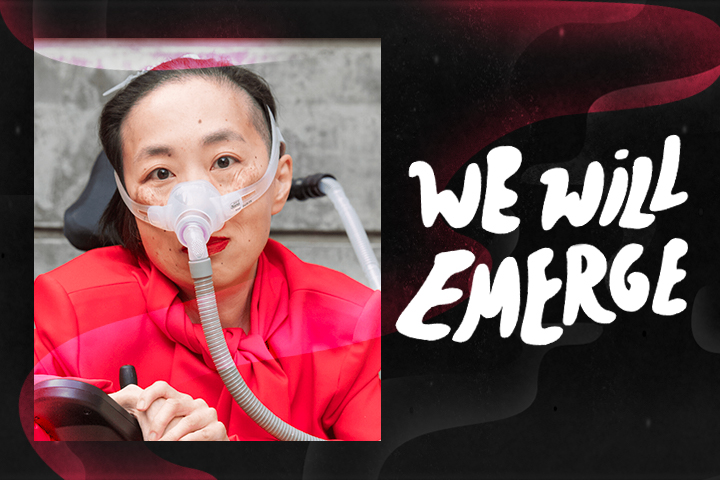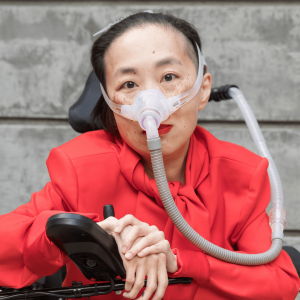The Political is Personal

This essay is part of PEN America’s We Will Emerge project, a collection of essays speaking directly to voters around the country in advance of the U.S. election. This project is made possible with the support of Pop Culture Collaborative’s Becoming America Fund.
“All that you touch
You Change.
All that you Change
Changes you.
The only lasting truth
is Change.”
—Octavia E. Butler, Parable of the Sower
I am tired. I am angry. I am scared. As of today, when I turned in this essay, I have been sheltering at home for 216 days in San Francisco, a city on the unceded ancestral homeland of the Ramaytush Ohlone peoples, in a country built on white supremacy, genocide, and slavery. I have not left my home once for a single errand or appointment and will not do so until late 2021 or 2022 unless absolutely necessary. Along with indigenous, black, brown, poor, and older people, disabled people have been considered “high risk” and acceptable losses in the brutal lurch to restart the economy and reassert a normalcy upheld by capitalism, racism, ableism, and ageism.
Understanding the dangers early on like many marginalized people who are chronically ill, immunocompromised, and disabled, I had to deal with the anxiety of the unknown and find a way to adapt and survive in these new conditions. In addition to my ongoing work and preparation for a book launch this past June, here are a few things I did in the last seven months:
- Completed an advance directive and spoke to my family members about my wishes if I became infected with COVID-19.
- Spoke out about the impact of the pandemic on disabled people—healthcare rationing, discriminatory triage guidelines, the dangers of congregant settings, and voting accessibility—in essays, blog posts, social media, and interviews.
- Created space for disabled people to share their stories and perspectives regarding political issues related to the coronavirus on my podcast, through guest essays on my website, and in Twitter chats using the hashtag #CripTheVote, a nonpartisan online movement in partnership with my friends Gregg Beratan and Andrew Pulrang.
Did I mention I was tired?
Being a ventilator user with a neuromuscular disability compelled me to push back against the societal devaluation of disabled lives and question the current systems that perpetuate harm and inequality by design. Experiencing such uncertainty and vulnerability prompted me to think about who truly matters in this democracy when many people are excluded from citizenship and political participation.
I may be tired, but I want to live.
At the same time, there are people who choose to be apolitical or disengaged in rejection of the current political system. Many of these same people think eugenics and Nazism are relics of the past, a thought exercise instead of an immediate existential threat. I cannot be anything but political; it is personal and a matter of life or death. Here are a few things fueling my activism and decision to vote:
- According to the Kaiser Family Foundation, 84,136 people died in long-term care facilities from COVID-19 accounting for 40 percent of total deaths in the United States (as of October 8, 2020).
- While 39 states (including the District of Columbia) voted to expand Medicaid, the Supreme Court will rule this November in the case of California v. Texas, which could strike down the Affordable Care Act, leaving millions uninsured in the middle of a major public health crisis and subject to greater economic and housing insecurity.
- The number of poor people has grown by eight million since May 2020 as assistance from the federal stimulus packages ended.
- Voter suppression tactics are widespread with fewer polling places and official drop-off boxes for absentee ballots forcing long lines and wait times. For example, a federal appeals court ruled that the state of Texas is allowed to limit one drop-off site for absentee ballots per county.
The stakes have always been high long before this administration. However the cruelty, hate, and damage is in the open and undeniable. For people to look away, say nothing, or assume it is futile to take action is to be complicit in autocracy.
“Being a ventilator user with a neuromuscular disability compelled me to push back against the societal devaluation of disabled lives and question the current systems that perpetuate harm and inequality by design. . . I may be tired, but I want to live.”
Did I mention I was angry and scared?
With Election Day approaching, I saw slogans such as “each person has a voice when they vote” and that “voting is a form of power.” Voting is a right I do not take for granted but I have complicated feelings about it. Why do we place such primacy on voting over other forms of political participation? Who or what is served when we exercise power as individuals versus collective power?
I completed my absentee ballot a few days ago as I have for every election in the past decade because it is one way to make my views known. I remind myself of all the other ways people are involved with their communities knowing that many still cannot vote, such as undocumented people, some people with felony convictions, and some people under guardianship.
For those eligible to vote, the act of voting remains inaccessible and difficult for many due to systemic barriers and voter suppression tactics. Seeing people vote early is heartening but not praiseworthy. Voting should be effortless and expanded, not a Darwinian gauntlet. No one should have to risk their health and wait in line for hours to ensure their vote is counted. No one should have to worry if the United States Postal Service will deliver and return their absentee ballot on time.
Change, whether it’s by voting or other means, keeps our society alive. It creeps me out to think of people who want everything to stay the same or believe that change is acceptable as long as they benefit materially. Last year at the Autistic Self Advocacy Network Annual Gala I gave a keynote speech about the politics of change:
“. . . I take action because I want change for us, by us. And I try to remember that change is a verb. Change does not begin and end with a piece of legislation. Change is a calling and creative practice. Change doesn’t happen overnight and sometimes we may never see the fruits of our labor . . . There’s a Vulcan philosophy from Star Trek: ‘Infinite Diversity in Infinite Combinations.’ It’s the idea that embracing difference generates progress and beauty. I have faith in the infinite potential of disabled people. We will lead the way in transforming activism as we know it because of our differences and creativity. And I believe in all of us: the folks in this room, on the Internets, and beyond.”
“Voting should be effortless and expanded, not a Darwinian gauntlet. No one should have to risk their health and wait in line for hours to ensure their vote is counted. No one should have to worry if the United States Postal Service will deliver and return their absentee ballot on time.”
Everyone has the capacity to participate in big and small ways to make a difference. You don’t have to be an organizer or leader in order to be an activist—you can talk to your neighbor, provide water and supplies, text/phone bank, donate, mail a postcard, retweet and share information, attend meetings and events, volunteer, protest, meditate, and most importantly listen. The revolution will be accessible and centered on diverse bodyminds.
All over the world people are meeting this moment in the fight for Black lives and demonstrations against fascism. People power is not just political power. People power is mutual aid, care, safety, and solidarity. Learning about disability justice from work by Patty Berne and other disabled people of color who formed this framework, I feel the intimacy and power of interdependence when we recognize each other’s strengths and vulnerabilities, when we don’t have to rely on the state or institutions to have the solutions, and when we can move forward toward liberation and justice together. Interdependence is the way, lighting the path in this darkness.
Did I mention I still have hope for the present and future?
The other day I joked to a friend that safety is an illusion and I never felt safe to begin with as a disabled person in a nondisabled world. This year magnified the fissures between those entitled to feel safe and belong and those who do not. The urgency is real in knowing what’s at stake as we come upon another major election while deaths and infections from the coronavirus continue to rise without meaningful leadership or strategy. I may be tired, angry, and scared, but I am not without hope.
Being creative and engaged keeps me going. Group text messages, cat videos, and hot coffee and pastries keep me going. Pleasure, laughter, and joy keep me going. The abundant wisdom of disabled people gives me the power to continue. I write my truths as an act of love and resistance in the face of overwhelming bleakness because I know this is not a singular act. I dream with wild abandon imagining a better world for all of us. Each action, idea, and word is a step toward change.
 Alice Wong (she/her) is a disabled activist, media maker, and consultant based in San Francisco. She is the founder and director of the Disability Visibility Project, an online community dedicated to creating, sharing, and amplifying disability media and culture created. Currently, Alice is the editor of Disability Visibility: First-Person Stories from the Twenty-First Century available now from Vintage Books (2020). You can find her on Twitter at @SFdirewolf.
Alice Wong (she/her) is a disabled activist, media maker, and consultant based in San Francisco. She is the founder and director of the Disability Visibility Project, an online community dedicated to creating, sharing, and amplifying disability media and culture created. Currently, Alice is the editor of Disability Visibility: First-Person Stories from the Twenty-First Century available now from Vintage Books (2020). You can find her on Twitter at @SFdirewolf.






